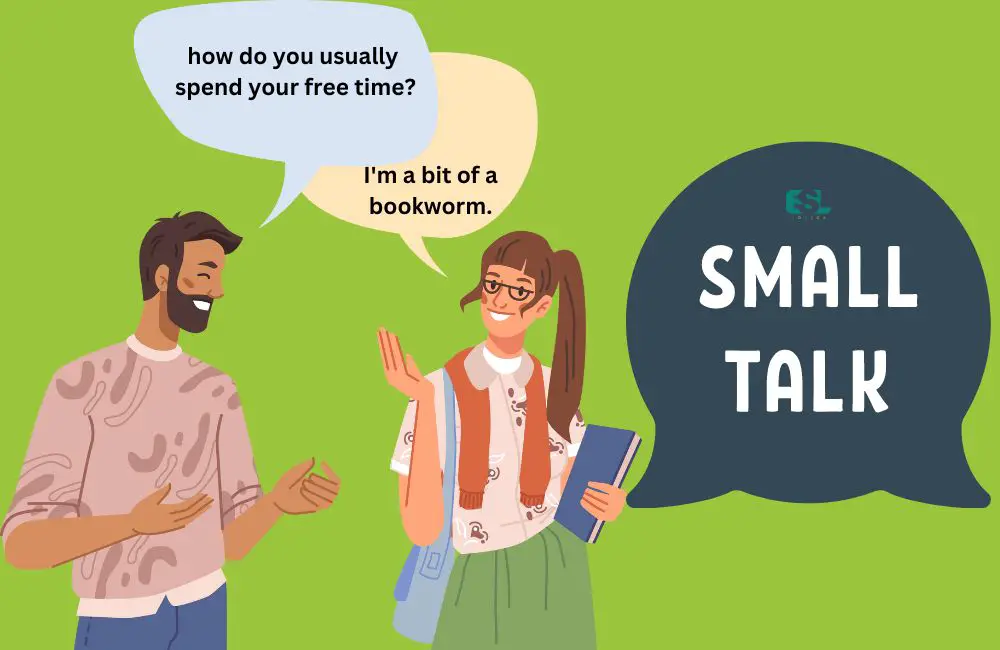As an English teacher, I know how confusing and tricky it can be for ESl learners to navigate casual conversations. If you’re an ESL learner, you’re probably familiar with the basic grammar and vocabulary, but you might find small talk – those everyday, informal conversations – somewhat challenging.
That’s why I decided to put together this guide: to share tips and advice on how to respond to small talk in English and make these conversations easier and more enjoyable.
To respond to small talk in English, show genuine interest, maintain a positive tone, and give brief but meaningful answers. Typical small talk topics include weather, work, hobbies, and current events. Listening to native speakers, role-playing, and practicing are key to mastering small talk.
In the later part of this comprehensive guide, you’ll find practical strategies to improve your small talk skills. So, keep reading.
Table of Contents
- What is Small Talk?
- Basic Principles of Responding to Small Talk
- Typical Small Talk Topics and How to Respond
- How to Practice Small Talk
- In Conclusion
What is Small Talk?
Small talk is a form of social interaction that involves exchanging pleasantries, comments, or observations about universal, non-controversial topics. It is the first step towards establishing a connection with someone, be it a coworker, a neighbor, a friend, or even a stranger.
The purpose of small talk is not to delve into profound philosophical discussions or contentious debates. Rather, it is about creating a welcoming and pleasant atmosphere, which can often act as a stepping stone to more in-depth conversations. Small talk helps create rapport, find common ground, and foster a sense of community.
To illustrate, imagine you are in an elevator with a colleague you don’t know very well. You might start a conversation by mentioning the weather, saying, “It’s really sunny today, isn’t it?” This opens the door for them to respond by agreeing and adding their thoughts on the weather, which keeps the conversation flowing.
Another instance of small talk could be when you run into an acquaintance at a grocery store. You might talk about the product that’s in season or mention a new product on the shelves. This serves to break the silence and build a connection, albeit a brief one.
Similarly, at a social gathering or a party, you might find yourself discussing popular topics such as recent movies, sports, or current events. You might comment on how much you enjoyed the latest superhero movie or discuss your surprise at the results of a recent football match.
While these conversations might seem insignificant or mundane, they play a crucial role in human social interactions. They help ease the way into more meaningful conversations, reduce awkwardness, and allow us to navigate social situations more comfortably.
Basic Principles of Responding to Small Talk
When we engage in small talk, it’s not just about what we say but also how we respond. Responding appropriately to small talk can make the conversation more engaging and meaningful and can help establish a positive connection with the other person. In this section, I will explain some of the key principles of responding to small talk.
1. Showing Interest
Showing interest in what the other person is saying is a fundamental part of any conversation, especially in small talk. When you show genuine interest, it signals that you value the other person’s thoughts and experiences.
Active listening is a crucial part of showing interest. This means not just hearing the words the other person is saying, but really focusing on them, understanding them, and responding appropriately. This could involve nodding your head, making appropriate facial expressions, or making affirmative sounds like ‘uh-huh’ or ‘right.’
Ask follow-up questions to show that you are interested and engaged. If someone mentions they went hiking over the weekend, you could ask where they went or if they often go hiking. This encourages them to share more and keeps the conversation going.
Remember to respect the other person’s responses, even if you don’t agree or share the same interest. For example, if someone says they love a TV show you don’t like, you might respond with: “I see; what do you enjoy most about that show?” It’s all about creating a positive interaction.
2. Keeping It Positive
The essence of small talk lies in its light-hearted, positive nature. It serves as a pleasant interlude in our often busy and stress-filled lives. This is why it’s crucial to maintain a positive tone when engaging in small talk.
If someone asks about your day or work, even if it’s been tough, try to find something positive to share. Instead of launching into a list of problems or complaints, you might say: “It’s been quite a day, but I managed to finish a project I’ve been working on, so that’s good.”
At the same time, it’s important to be mindful of the other person’s feelings. If they share something positive, celebrate with them. If they share something negative, offer empathy and understanding while steering the conversation back to a more positive note.
3. Being Concise
While showing interest and keeping the conversation positive is vital, your responses must also be concise. By its nature, small talk is made up of brief exchanges and should not monopolize the conversation or go off into lengthy monologues.
Try to keep your responses short and to the point. If someone asks how your weekend was, you might briefly summarize: “It was great; I spent some time with family and caught up on some reading.”
Being concise also means avoiding overly complex or technical language that might confuse or alienate the other person. Try to stick to simple, everyday language that the other person can easily understand and relate to.
By combining these principles – showing interest, maintaining positivity, and being concise -, you’ll be able to engage effectively in small talk and create more enjoyable and meaningful interactions.
Typical Small Talk Topics and How to Respond
While small talk can span a range of subjects, there are certain topics that frequently appear in such casual conversations. These are usually non-controversial, easy-to-talk-about subjects that most people can relate to in one way or another.
In this section, I will delve into some of these typical small talk topics, such as the weather, work, and free time activities, and provide some guidance on how to respond effectively.
1. The Weather
An evergreen topic for small talk in cultures around the world is the weather. This is because the weather is a shared experience – it affects everyone, and it’s something that we can all observe and comment on.
When someone starts a conversation about the weather, it’s usually a good idea to agree with their statement and then add a bit more detail. This keeps the conversation going and opens up opportunities for further discussion.
If someone says, “It’s quite chilly today, isn’t it?” instead of merely agreeing, you can add your own observation, such as, “Yes, it is. I noticed the leaves are starting to change color, too. It really feels like autumn is here.”
Imagine it’s early in the morning, and you’re stepping out of your apartment to head to work. As you’re about to leave the lobby, you spot a neighbor whom you’ve casually greeted a few times but never really engaged in a conversation. Seeing this as a good chance to connect a bit more, you decide to strike up some small talk.
The focus of your conversation will revolve around the weather, and your plans for the day, given the sunny conditions, and you’ll also show interest by asking about their plans. So, here is a sample conversation.
Neighbor: Good morning! It’s another beautiful sunny day, isn’t it?
You: Good morning! Absolutely, it’s lovely outside. I was just thinking about how the sunny weather lifts everyone’s spirits.
Neighbor: It certainly does. It makes the city look more vibrant.
You: That’s true. I’m actually planning to make the most of it and go for a walk in the park during my lunch break. The weather is just perfect for it.
Neighbor: That sounds wonderful! I might take a cue from you and do the same. I’ve been cooped up in my home office for too long.
You: That’s a great idea! A bit of fresh air and sunshine can do wonders for our mood and productivity. Enjoy your walk later.
2. Work
Work or school is another popular topic for small talk. Almost everyone has some form of occupation or academic pursuit that they spend a significant amount of time on. It’s best to keep the tone positive and light when discussing work or school, focusing on interesting projects or developments rather than complaints or frustrations.
If someone asks, How’s work going? Instead of providing a monosyllabic answer, share a bit more information that can lead to further conversation. For instance, you might say, “It’s going well. I’m currently collaborating with a talented team on a new marketing campaign. It’s quite challenging, but I’m learning a lot.”
Consider that you’re in a coffee shop waiting in line to order, and you notice the person in front of you is from your industry – you recognize the logo on their laptop bag. Taking this opportunity to engage in small talk, you decide to initiate a conversation about work, discuss your roles, and perhaps share some interesting ongoing projects. So, here is a sample conversation.
Stranger: I couldn’t help but notice your laptop bag. You work for the “Niche Ramp” company, right?
You: Yes, that’s right! I’m a project manager there. It’s nice to meet someone from the same industry.
Stranger: Interesting! I work as a software engineer for ABC company.
You: Oh, that’s great. I’ve heard a lot about your company. How do you find the experience there?
Stranger: It’s challenging but rewarding. Currently, I’m working on an exciting project that involves creating new software for data management.
You: That sounds like a fascinating project. I’m also working on a new project focusing on improving client engagement. It’s quite a learning experience.
3. Free Time and Hobbies
Free time activities or hobbies offer a vast field for small talk as they reveal personal interests and passions. Discussing hobbies can lead to discovering shared interests or learning about new activities.
If someone asks, What do you do in your free time?, try to give an answer that provides some detail about your hobbies or interests, like, I enjoy cooking. Lately, I’ve been trying out different Italian recipes. This not only shares something about you but also allows the other person to share about their cooking experiences or love for Italian food.
Let’s say you’ve recently moved to a new city, and you’re attending a local social event to meet new people. At the event, you meet someone who seems friendly, and you decide to engage in small talk about your hobbies and free time activities to know them better. So, here is a sample conversation.
Stranger: So, how do you usually spend your free time?
You: I’m a bit of a bookworm. I love spending time reading novels and exploring different genres. Currently, I’m reading a mystery novel. How about you?
Stranger: That’s cool. I also enjoy reading, mostly non-fiction. Apart from that, I love cycling and exploring different parts of the city.
You: That’s interesting. I’ve been thinking about getting into cycling myself. It seems like a great way to explore the city and stay active.
Stranger: Definitely! Feel free to ask if you need any advice on how to start or the best cycling routes in the city.
You: I’ll definitely take you up on that offer. It was nice talking to you.
4. Current Events
Another typical topic for small talk is current events. This could involve the latest news, recent movies or books, sports, or popular culture. Discussing current events can be a good way to gauge the other person’s interests and opinions, but keeping the conversation neutral and avoiding controversial issues is important.
For instance, if you’ve recently seen a popular movie, you could say, “Have you seen the latest James Bond movie? I thought the special effects were really impressive.” This invites the other person to share their opinion and can lead to a fun discussion about movies.
You’re waiting for a friend in a local cafe. While sipping on your coffee, you notice the person sitting next to you reading a newspaper article about a recent popular movie. Seeing this as a chance to engage in casual conversation, you decide to discuss the movie, share your thoughts, and inquire about their opinion. So, here is a sample conversation.
You: Excuse me, I couldn’t help but notice the article you’re reading. It’s about the recent James Bond movie, isn’t it?
Stranger: Yes, it is. Are you a James Bond fan?
You: I do enjoy the series. In fact, I watched this latest one last weekend. I thought the special effects were really impressive.
Stranger: I’ve heard a lot about it. It’s on my watchlist for this weekend.
You: You’ll certainly enjoy it. Do you usually follow new movie releases?
Stranger: Yes, I do. It’s one of my weekend indulgences. I love catching up on the latest movies.
You: That sounds like a great way to unwind over the weekend. Hope you enjoy the movie!
5. Travel
Travel is a great topic for small talk because it opens up a wide array of potential sub-topics, including different cultures, cuisines, sights, and personal experiences. If someone brings up a recent or upcoming trip, you can ask questions about the destination, their travel plans, or their favorite memories from the trip. For example, if someone says they recently visited Paris, you could respond with, “That sounds wonderful! What was your favorite part of the trip?”
You’re at a friend’s housewarming party, and you’ve just been introduced to a group of people. You’re all making small talk, and someone brings up their recent vacation to Spain. Seeing an opportunity to participate in the conversation, you ask them about their trip, share your travel experiences, and express interest in their stories. So, here is a sample conversation.
Person: I just returned from a vacation in Spain. It was an amazing trip.
You: That sounds wonderful! Spain is such a beautiful country. What was your favorite part of the trip?
Person: Oh, there were so many highlights. But I especially loved exploring Barcelona. The architecture, the food, the culture… it was all incredible.
You: Barcelona is beautiful; the mix of old and modern architecture is unique. Have you visited the famous Sagrada Familia?
Person: Yes, it was at the top of my list. The detail and scale of it are simply awe-inspiring. It’s unlike any other cathedral I’ve seen.
You: Absolutely, it’s an architectural marvel. I visited it a few years back and was equally amazed. I hope to visit Spain again sometime.
6. Food and Drink
Food and drink are universal topics that everyone can relate to. This can range from discussing favorite restaurants or recipes to talking about local food markets or recent food trends. If someone mentions a restaurant they recently dined at, you could follow up with, “Oh, I’ve heard good things about that place! What dish would you recommend?”
You’re at a local farmers’ market, browsing through various stalls. The person at the next stall is raving about a local restaurant they recently tried. Seeing a chance to engage in a conversation, you decide to ask them about their restaurant experience, share your own dining experiences, and express interest in their recommendations. So, here is a sample conversation.
Person: The new Italian restaurant downtown is amazing. Their pasta is out of this world.
You: I’ve heard good things about that place. I love Italian food. What dish would you recommend?
Person: You should definitely try their seafood linguini. It was fantastic. And don’t miss their tiramisu for dessert.
You: That sounds delicious. I’ve been looking for a good Italian restaurant to try. Thanks for the recommendation.
Person: My pleasure. I hope you enjoy it as much as I did.
7. Sports
For many people, sports are a significant part of their lives, making them a common topic for small talk. Whether it’s discussing last night’s game, a favorite team, or even a local sports event, there’s always something to talk about. If you’re not a sports fan, you can still engage in the conversation by asking about the rules of the game or why they like the sport. For instance, “I’m not familiar with cricket, but it seems very popular. What do you enjoy most about it?”
You’re at a local sports bar watching a cricket match. The person sitting next to you seems quite excited and is enthusiastically cheering for their team. Seeing this as an opportunity to make small talk, you decide to ask them about the game, express your interest, and possibly learn something new about cricket. So, here is a sample conversation.
You: You seem to be a big cricket fan.
Person: Yes, I grew up watching and playing cricket. It’s an exciting game.
You: I’m not familiar with cricket, but it seems very popular. What do you enjoy most about it?
Person: There’s a lot to enjoy, but I love the strategy involved in the game. It’s not just about physical strength but also about smart decision-making and teamwork.
You: That sounds intriguing. Maybe I should start following cricket too.
8. Family
Talking about family is another good option for small talk. This can involve sharing stories about your children, discussing family-oriented activities, or just sharing small, positive details about your family life. For example, if someone asks about your family, you could say, “My son just started playing the piano, and it’s been really fun listening to him practice and improve.”
You’re at a community picnic and talking with another parent from your child’s school. They start sharing some stories about their kids. Seeing a chance to engage further in the conversation, you decide to talk about your family, ask about their experiences, and share common parenting joys and challenges. So, here is a sample conversation.
Parent: My daughter just started taking dance lessons. It’s been fun to see her enthusiasm.
You: That’s wonderful! My son has recently picked up the piano. It’s really fun watching him practice and improve.
Parent: That’s great. It’s so important for kids to have creative outlets.
You: Absolutely; it helps them learn new skills and boosts their confidence. Plus, it’s a joy to see them enjoy their hobbies.
Parent: Indeed, it’s one of the pleasures of parenting.
As we’ve seen in these scenarios, the key to making small talk is to show genuine interest in the other person’s life, experiences, and opinions. Remember to respond positively, ask follow-up questions, and share relevant details about your own experiences. With practice, you’ll become more comfortable and adept at making small talk in English.
How to Practice Small Talk
Like any other skill, becoming proficient at small talk requires practice. Even native English speakers can sometimes struggle with mastering the nuances of small talk. But don’t worry! There are several effective methods that can help you improve your small talk skills.
In this section, I will share some practical strategies, such as listening, mimicking, and role-playing, which can aid you in becoming more comfortable and adept at handling small talk in English.
1. Listening and Mimicking
Listening and mimicking is a powerful strategy to improve your response to small talk. It involves immersing yourself in English language environments and observing how native speakers engage in small talk.
Pay attention to the phrases they use, how they respond to different topics, their tone of voice, and their body language. This exposure to real-life language usage will provide you with valuable insights into how small talk works.
You can listen to native English speakers in various ways. One of the most accessible methods is through media, such as English movies, TV shows, radio broadcasts, or podcasts. These sources often have natural, conversational dialogues that you can learn from.
For instance, a sitcom like ‘Friends’ or ‘The Office’ can be a fun way to pick up common small talk phrases and understand the rhythm and flow of casual conversation.
Another effective way is by attending social events where English is spoken. This could be a local meetup, international club, or online language exchange platform. The goal is to surround yourself with English conversations and absorb as much as possible.
2. Role-Playing
Role-playing is another excellent tool for practicing small talk. It allows you to simulate various conversational scenarios, helping you to prepare for real-life situations. This method also provides a safe environment for you to make mistakes, learn from them, and improve.
You can role-play with a language partner, a tutor, or even on your own. Create different small talk scenarios and take turns playing different roles. For example, one of you could be a cashier at a supermarket making small talk with a customer. Another scenario could be two parents chatting while waiting to pick up their kids from school.
When role-playing, make sure to practice different topics of small talk that we discussed earlier, like the weather, work, free time activities, and current events. Also, remember to incorporate the principles of effective small talk, like showing interest, keeping things positive, and being concise.
With consistent practice, you’ll notice a gradual improvement in your small talk skills. Remember, practice makes perfect. So, don’t be afraid to make mistakes, and most importantly, enjoy the process of learning and improving.
3. Using Language Learning Apps
In the digital age, there are numerous language-learning apps that can help you practice small talk in English. Apps like Duolingo, Babbel, and Rosetta Stone often have sections dedicated to conversational skills.
They provide a variety of dialogues and exercises focusing on different small talk scenarios. Practicing with these apps can provide a structured and self-paced way to enhance your small talk abilities.
4. Joining English-Speaking Communities
Joining English-speaking communities, both online and offline, is an excellent way to practice small talk. These communities provide real-world opportunities to interact with a diverse range of people and improve your conversational skills. They could be social clubs, sports teams, book clubs, or online discussion forums.
In these communities, you can engage in conversations about various topics, practice the art of small talk, and gain feedback from native or more experienced English speakers. Plus, it’s a great way to make new friends and expand your network.
5. Engaging in Cultural Exchange Programs
Cultural exchange programs offer a unique opportunity to immerse yourself in an English-speaking environment. These programs could be student exchange programs, volunteering projects, or work abroad programs. They provide rich, real-life experiences that allow you to practice English in various contexts, including small talk.
Participating in such programs can help you understand cultural nuances and conversational cues, which are vital aspects of effective small talk. You’ll get to meet people from different walks of life, share experiences, and engage in countless small talk interactions.
6. Taking English Conversation Classes
Last but not least, enrolling in English conversation classes can be extremely beneficial. These classes are specifically designed to improve your spoken English skills, including small talk. You’ll have the chance to learn from experienced teachers, practice with fellow students, and receive constructive feedback.
Many language schools offer conversation classes. You can also find online platforms providing one-on-one or group conversation lessons. Such classes often cover a range of conversational topics, giving you a wide repertoire of scenarios to practice your small talk.
In Conclusion
Mastering the art of small talk in English is an invaluable skill, especially for non-native speakers. While small talk may seem simple on the surface, it requires a delicate balance of attentiveness, tact, and cultural understanding.
From showing genuine interest and maintaining positivity to practicing regularly, each aspect plays a significant role in becoming adept at this subtle form of communication.
By familiarizing yourself with common small talk topics and using the strategies mentioned in this guide, you can turn these brief interactions into opportunities for deeper connections. Remember, the essence of small talk lies in creating a pleasant atmosphere and fostering relationships, making it a worthwhile skill to develop.
Be patient with yourself as you learn, practice, and improve, and remember to enjoy the process. Happy chatting!






